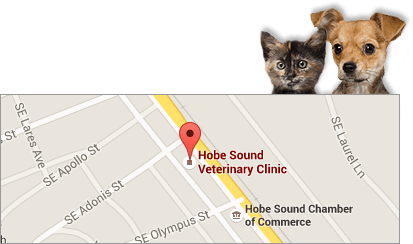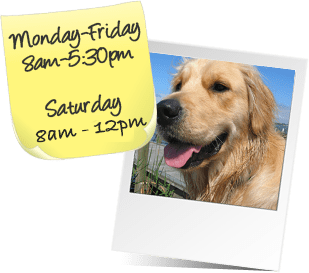If guests are coming to your home for a party, meal, or special event, it’s important to make some considerations regarding your pets. This way, everything runs smoothly on the big day! Here are a few tips for helping your guests and your furry friends get along successfully:
Before Guests Arrive
First things first: vacuum and dust throughout your home to keep things clean and fresh. This is also very important if any of your guests suffer from allergies to pet dander. In fact, if a guest has severe allergies, it may be necessary to secure your pet in another room entirely for the duration of your gathering. Setting up air filters can also be very useful for allergy sufferers. If you’re planning an outdoor gathering, you might want to check out our article on Helping Your Dog Get Through Mosquito Season for tips on keeping your pet comfortable outdoors.
Don’t allow pets into bedrooms or closets where you store your guests’ coats or hats. Some of our animal companions—particularly our feline friends—might decide to bed down on clothing items like these!
Greeting Tips
Not everyone appreciates a big slobbery dog running up to greet them when they enter a home. If your dog is the type to do this, it might be prudent to keep him in another room or inside his crate until all your guests have arrived. This is also helpful if your pet is the type to dart out of the first open door he sees—you don’t want to deal with an escaped pet before your gathering even begins.
Mealtime Etiquette
No one likes to be bothered by a begging pet throughout an entire meal. Keep your pet elsewhere if they beg at the dinner table. Also make sure that your guests don’t feed your animal companion without your knowledge; politely let your guests know that your pet isn’t allowed to receive table scraps without your approval.
It’s also important to keep a close eye on any harmful foods you may be serving. Plenty of human foods—onions, garlic, avocado, chocolate, candy, grapes and raisins, and many more—aren’t safe for pets to consume.
Preventing Animal Anxiety
Some pets simply won’t be comfortable with the hustle and bustle of your party or special meal. In a quiet room, set up a “safe zone” just for your pet, complete with a bed, soft blankets, and a few of your pet’s favorite toys. Lead your animal friend here if they start to become anxious.
Our Advice on Entertaining Guests When You Own a Pet in 2024
How can pet owners determine if their pet is comfortable around guests?
Pet owners can determine if their pet is comfortable around guests by observing the pet’s body language and behavior. Signs of comfort include a relaxed posture, wagging tail, and calm interactions. Conversely, signs of discomfort may include hiding, excessive panting, yawning, drooling, or showing the whites of their eyes. Pets may also display avoidance behaviors such as retreating to a different room or appearing tense and vigilant. It’s essential for owners to monitor these signals to ensure their pet is at ease during social gatherings.
What specific training techniques can pet owners use to help their pets?
Pet owners can use several specific training techniques to help their pets adapt to social settings with guests. Positive reinforcement, such as treats and praise, is effective for rewarding calm and sociable behavior. Gradual desensitization can help pets become accustomed to the sights and sounds of a gathering by slowly introducing them to these elements in controlled situations. Consistency is key in reinforcing commands like “sit” or “stay” to manage greetings. Crate training also provides a safe space for pets, reducing stress during busy events.
What are some strategies for managing interactions between pets and children during gatherings?
To manage interactions between pets and children during gatherings, it’s crucial to supervise all encounters closely. Teach children how to approach and touch pets gently, emphasizing the importance of respecting the animal’s space and comfort. Introducing pets and children gradually in a controlled environment can help both adjust calmly. Establishing and enforcing rules, such as not allowing children to chase pets or disturb them while they are eating or sleeping, is essential. Providing a separate, quiet space for pets can also prevent overstimulation and ensure safety for all attendees.
How can pet owners handle situations where a guest is fearful or uncomfortable around their pet?
When a guest is fearful or uncomfortable around a pet, pet owners should first ensure the pet is securely contained or placed in another room, prioritizing the guest’s comfort. Communication is key; the owner should explain the pet’s behavior and temperament to the guest to alleviate concerns. Offering to introduce the pet slowly and under controlled conditions may help some guests overcome their discomfort. However, it’s essential to respect the guest’s feelings and maintain a safe distance if their discomfort persists, ensuring a positive experience for everyone involved.
What should pet owners do if their pet does become anxious, aggressive, or disruptive during a gathering?
If a pet becomes anxious, aggressive, or disruptive during a gathering, pet owners should immediately remove the pet from the situation to a pre-established safe space, such as a quiet room or crate, where the pet feels secure. Providing familiar items like toys or bedding can help soothe the pet. Owners should remain calm and reassuring to help stabilize the pet’s mood. If the behavior persists, it may be necessary to consult a veterinarian or a professional trainer to address underlying issues or to develop better coping strategies for the pet.
Please contact us, your local animal clinic in Hobe Sound, FL for all of your pet’s veterinary care needs. If you’ve noticed your pet experiencing allergies or skin issues, especially around guests or during certain seasons, our Pet Allergies and Veterinary Dermatology service can provide specialized care to keep your furry friend comfortable.




